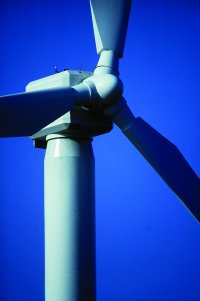 Renewable or clean energy development has been growing rapidly in parts of Central and Eastern Oregon, as large wind turbine farms sprout up. Rural communities see the economic benefits of some job growth and property tax revenue.
Renewable or clean energy development has been growing rapidly in parts of Central and Eastern Oregon, as large wind turbine farms sprout up. Rural communities see the economic benefits of some job growth and property tax revenue.
 THE SITUATION
THE SITUATION
Renewable or clean energy development has been growing rapidly in parts of Central and Eastern Oregon, as large wind turbine farms sprout up. Rural communities see the economic benefits of some job growth and property tax revenue. But for the most part, these projects — and the proceeds of the power sales — are owned by out-of-state investors and energy developers.
THE INNOVATION
Paul Woodin at Western Wind Power, based in Goldendale, Wash., is pushing partnerships between communities in Oregon and equity investors that would allow the two parties to share the proceeds of small ($5 million to $25 million) clean-energy projects, from mini wind farms powering a few thousand homes to miniature hydroelectric turbines in irrigation canals. Investors — individuals or energy-oriented backers such as John Deere Wind Energy — would provide some of project capital and in return use the tax incentives of equipment depreciation and state energy tax credits of up to $3.5 million. Local project partners — communities, electricity cooperatives, farmer cooperatives — would kick in some financing, potentially using state-backed energy project loans, and take over ownership of the project from investors when the tax credits run out after 10 years. The income comes from selling the power to local utilities or statewide biggies such as Pacific Power or Portland General Electric.
Similar combinations of financings and ownership have been used to fund small wind developments in the Midwest, particularly in Minnesota. Woodin and several other renewable energy developers are feeding on some unique tax incentives and loans in Oregon and the growing interest in renewable energy in the state. “Washington doesn’t have these tools in place,” Woodin says, so he’s concentrated here.
DOES IT HAVE JUICE?
Woodin, a former aluminum plant manager and a project manager at the large Klondike Wind Farm in Sherman County, says he has more interested investors than small projects in the Oregon right now. The key is if they can build the projects to deliver energy at what the Oregon Public Utilities Commission says is a cost comparable to new natural gas-fired power plant. Currently, the cost is set in the 4-6 cents per kilowatt-hour range, which small renewable projects can’t deliver. Woodin and others have appealed to the PUC pushing for a rate closer to 8 cents per kilowatt-hour, which is the projected cost in California and which he says reflects what new power plants actually cost. That would make projects he’s working on — a wind farm in Sherman County and a wood-waste boiler and small hydro turbines in Hood River County — more competitive and open them up to power purchases from utilities. If they can’t get help from the PUC, Woodin and others say they’ll lobby for more Energy Trust of Oregon funding for small clean-energy projects as part of energy bills expected to go to the Oregon Legislature next year. Suffice it to say, localized clean energy’s future hinges on public policy.
— Oakley Brooks
Have an opinion? E-mail [email protected]


